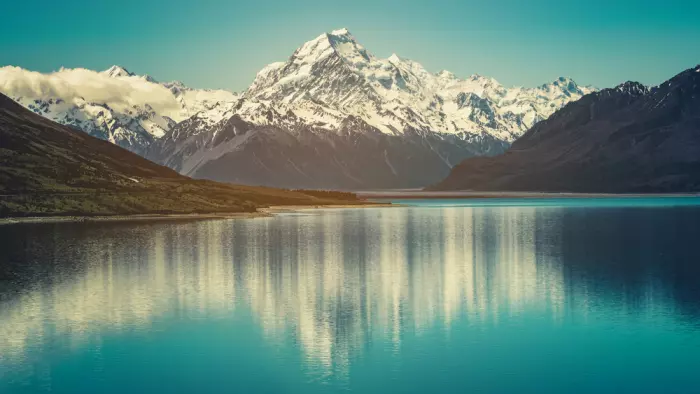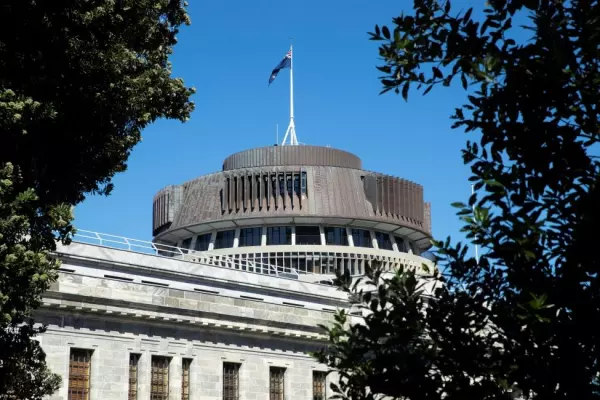A precedent-setting legal case could force the crown to co-design a new freshwater regulatory system with Māori. Oliver Lewis and Ian Llewellyn report.
Swimming in lakes and rivers used to be a summer rite. But due to overallocation and pollution, taking a dip in many lakes and rivers in Canterbury and the wider South Island will now – quite literally – make you sick.
Te Maire Tau, an associate professor at the University of Canterbury and upoko, or senior leader, of the Ngāi Tahu hapū Ngāi Tūāhuriri, says many waterways are in crisis.
“It’s a failure of government and an inability of the mechanism they have to regulate it properly for the community,” he says, "for all New Zealanders, not just Ngāi Tahu.”
In October 2020, Tau, other tribal leaders and the Ngāi Tahu tribal council Te Rūnanga o Ngāi Tahu lodged a claim in the high court at Christchurch against the crown.
They are seeking a declaration that Ngāi Tahu has rangatiratanga over wai māori (freshwater) in its takiwā, or tribal area, a massive domain which covers most of the South Island up to the Nelson Lakes.
The iwi also wants declarations that the crown should design a new freshwater governance and regulatory regime with Ngāi Tahu in its takiwā recognising its rangatiratanga; that the current regime constrains Ngāi Tahu rangatiratanga; and that the crown should not develop any new legislation or policy which would further constrain Ngāi Tahu rangatiratanga entitlements.
The landmark case is likely to have far-reaching implications for how the crown and Māori negotiate freshwater management, a fraught topic which the crown has always sought to defuse by arguing that no one owns water (various ministers have, however, conceded Māori have interests in water).
Previous legal bids to affirm Māori interests in water include a 2013 challenge by the Māori Council which unsuccessfully sought to block the partial privatisation of state-owned energy companies.
The supreme court said the sale wouldn’t prevent Māori interests from being recognised, noting then-deputy prime minister Bill English’s position that Māori have “rights and interests in water and geothermal resources”.
In 2019, the Waitangi Tribunal found progress had been made recognising these interests through greater input into some allocation and management of water. However, these steps have been slow and insufficient.
A test case might be needed, the tribunal said, to establish whether native title in freshwater (as a component of an indivisible freshwater taonga) exists and has not been extinguished.
This is similar to the central issue of the infamous foreshore and seabed debate, where the court of appeal ruled it could be possible in some cases that native or customary title to some sections of the foreshore and seabed could exist where unextinguished possession could be shown.
Many felt the government of the day overreacted and this turned into a national debate over who “owned” all the foreshore and seabed.
This case appears to be different. The Ngāi Tahu plaintiffs say their case isn’t about the native or customary title, nor is it a claim to ownership of water.
Differing views
Central to the case is the idea of 'rangatiratanga'.
According to the statement of claim, translations of the term include sovereignty, chiefly autonomy and the right to exercise authority. By the 19th century, it had evolved to mean the capacity to make law, the claim says.
For Tau and others, 'rangatiratanga' when it's used for wai māori includes the right to regulate and make decisions on how freshwater is used, managed and traded.
When Ngāi Tahu first went public with the case, the iwi was at pains to point out it wasn’t seeking ownership.
In its statement of defence, the crown denied the Ngāi Tahu definition of rangatiratanga.
BusinessDesk asked attorney-general and environment minister David Parker why. He didn’t say. Nor did he answer broader non-case specific questions. His spokesman said Parker was declining to comment as the matter was before the courts.
However, the minister has spoken publicly before, expressing views similar to English.
Essentially they have both argued Māori aspirations and interests are best dealt with on a catchment by catchment basis while recognising a need to sort frustrations over quality and allocation.
Parker has said water quality issues are central to Māori concerns and once progress is made on these, he will move on to allocation issues.
"We are very happy to acknowledge there are Māori rights and interests in water. I don't know that it really takes you any further towards a solution to say that there are ownership rights in water, whether it's for Māori or non-Māori," Parker said some years ago.
At the time of the Tribunal report, Parker agreed with its finding that the Resource Management Act had not been effective in preventing the decline of water standards.
"We have already acknowledged that water allocation issues need to be addressed both in terms of rights to take and use water but also rights to discharge pollutants to water," he said.
Tau, meanwhile, is happy to talk now.
“The purpose of the case is quite simple,” he says. “There’s been a failure of government and there’s been a failure of market.”
Existing freshwater management, run by regional councils, has led to pollution and poor outcomes, Tau says. Ngāi Tahu mahinga kai, food-gathering places which underpinned the traditional economy, have been progressively destroyed. And the tribe and other New Zealanders, Tau says, are bearing the costs of pollution – not the water users.
As an example, he refers to Te Waihora/Lake Ellesmere, a heavily polluted lake surrounded by farms in the Selwyn district. The lakebed was vested to Ngāi Tahu as part of its settlement.
“What the tribe is, is an externality sink for everyone else to dump their toxins and pollutants onto our land,” Tau said.
“What it means is we pay for everyone else’s profits."
The Ngāi Tahu settlement act passed in 1998 includes acknowledgement from the crown that Ngāi Tahu has rangatiratanga within its takiwā.
Article two of Te Tiriti o Waitangi also recognises this, the statement of claim says. The claim also makes the point that Ngāi Tahu rangatiratanga pre-dates 1840 and doesn’t derive from the crown.
Tau says when Ngāi Tahu settled with the crown, the Resource Management Act (RMA) was still relatively new. The tribe had an expectation its concerns over water would be addressed within the context of the RMA, he says.
“The settlement was meant to improve the situation. It has not.
“The tribe has participated in good faith and the outcomes are self-evident. The waterways are in an atrocious state."
In its statement of defence, the crown raises a number of arguments, including the ‘estoppel’ effect of the settlement; that the court shouldn’t intervene in how the crown makes policy and allocates resources; and that the rights asserted by Ngāi Tahu have been modified, suspended or extinguished by things like legislation, land alienation and the creation of legal rights.
Tau doesn’t buy it.
“Rangatiratanga hasn’t been extinguished and we’ll leave it at that,” he says.
A new regime
So what would a new water management approach recognising Ngāi Tahu rangatiratanga look like?
Tau can’t be specific while the matter is still being determined by the courts, but says any new regulatory regime would need to move from an extractive to a restorative approach.
For Ngāi Tahu, the mountains are ancestors. Coming from the mountains, the waterways carry the wairua, or spirit, of these ancestors.
“We take our ancestor responsibility seriously, to look after them,” Tau says.
The science, he says, is clear about the issues and the path to rehabilitating polluted waterways. To achieve this, Tau believes there needs to be much better data collection and monitoring.
“I think we have to relook at resource management in a completely different way, rather than fiddling around the sides,” Tau says.
“We can’t have an extraction economy, it’s got to be managed better.”
The ‘glacial’ judicial process
Progress on the case has been slow since Ngāi Tahu lodged the claim in October 2020.
Since then, two parties have joined as ‘interveners': Federated Farmers and the Environmental Defence Society (EDS).
Federated Farmers president Andrew Hoggard says the advocacy group was asked by the crown to prepare an affidavit for the case on the importance of water for rural communities. It later asked to join.
Hoggard says the group wanted to be involved to understand what rangatiratanga would mean in a practical sense and how any possible changes arising from the case – particularly for allocation – might affect its membership.
“If there are changes to current allocation it’ll affect farming businesses quite severely, or not, depending on what the change is,” he says.
“So it’s important we’re there to understand what that means and if necessary raise the concerns of our membership.”
There is extensive regulatory change currently happening in the freshwater space, including a suite of new rules and regulations dubbed the essential freshwater package. This includes a new national policy statement for freshwater management.
Hoggard says farmers are still coming to grips with the rules. With water management, he believes it’s important to strike a balance between environmental and economic outcomes.
“Parts of the regulation that’s coming, there isn’t that balance," he says.
“The concern is there’s an overwhelming push to go back to how things were pre-humans, so that’s not going to be realistic unless we all pick up and go to Australia.”
As for the case? While it’s still early days, Hoggard describes it as potentially precedent-setting.
“Depending on how this comes out it may happen elsewhere in the country so it’s important we understand what it means and have the ability to raise those concerns.”
EDS chief executive Gary Taylor won’t comment on specifics but says the group is taking a watching brief.
Like farmers, the Environmental Defence Society will be watching very carefully the impact of any decisions flowing from the case on the current freshwater quality standards process. Though, of course, the environmental movement will push back strongly against directions that may weaken moves to improve water quality.
Last year, Ngāi Tahu tried to speed up proceedings.
The parties applied to the court for a split trial, asking the court to hear as a preliminary issue whether Ngāi Tahu have rangatiratanga entitlements to wai māori within its takiwā.
Everything else flows from there, so if a judgement had come back in the affirmative the rest of the case could then have proceeded.
But the court declined the application last November, effectively ruling the principle and the potential outcomes were closely entwined.
Tau says it was a tactical attempt to get the case heard more quickly.
“It’s almost glacial, the judicial procedure,” he says.
Ngāi Tahu has some heavy hitters in its corner, including legal assistance from the former minister for Treaty of Waitangi negotiations Chris Finlayson. The iwi has also sought advice from First Nations people in North America and universities in the United States about how to frame the case, Tau says.
Ngāti Kahungunu, an east coast iwi in the North Island, is also preparing a statement of claim, he says.
The court has yet to schedule a date for the substantive hearing. It might not be until 2023. Tau reaches for a saying to describe the drawn-out process.
“The shortest way to get to the goal is the longest route, sometimes.”











